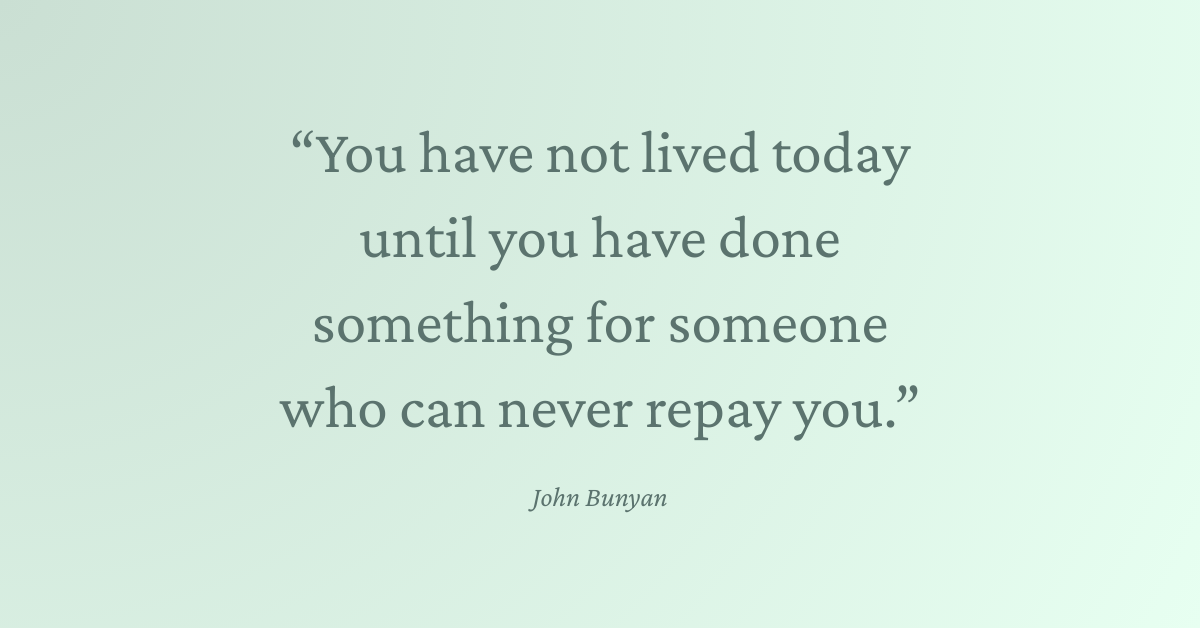By John Bunyan
Estimated reading time: 4 minutes
“You have not lived today until you have done something for someone who can never repay you.” This quote encourages a powerful idea: that true fulfilment comes from giving without expectation. In a world focused on achievement and reward, this message reminds us that a meaningful day may be defined not by what we get, but by what we give.
The idea of helping someone who can never repay you speaks to selflessness. It strips away the need for recognition or return. The quote invites us to pause and consider what really matters at the end of the day: a moment of kindness, a small sacrifice, a silent act of care. These are what give life its depth. It’s a message about living with heart, not just ambition.
What Does This Quote Mean?
This quote is a reminder of the quiet strength in kindness. It suggests that a well-lived life is one where our actions are driven by care for others, not personal gain. When we help someone who cannot repay us, the gesture becomes truly selfless. There is no anticipation of reward, no scoreboard, no favour returned. Instead, the act stands alone as something good and decent.
Helping others in this way creates a sense of connection and purpose. It can be as small as offering a seat on the bus or as committed as giving time to a local charity. These acts reveal our character more than any personal accomplishment. They teach us empathy and encourage us to look beyond ourselves.
This message also points to a broader view of success. It reframes a “productive” day as one that leaves the world slightly better for someone else. It can be easy to overlook the importance of this kind of impact, but it is often the most enduring. A life spent in service, even in small ways, is a life of depth and meaning.
There is strength in giving freely. It asks us to act with humanity, regardless of the outcomes. That mindset reshapes how we define purpose, and it brings stillness in a noisy world. The kind of day described in the quote doesn’t show up on a calendar or a to-do list, but it stays with us – and with others.
How Can You Use This Quote in Life?
Living by this quote doesn’t require wealth or influence. It calls for attentiveness, generosity, and a willingness to act. Here are a few ways it can be put into practice:
- Offer time to someone lonely, especially if they have nothing to give you in return. A short conversation with someone who lives alone can make a huge difference.
- Do small favours anonymously, like paying for a stranger’s coffee, giving away a book you enjoyed, or leaving a kind note on someone’s desk.
- Share knowledge or advice with someone early in their career. Your encouragement might shape their confidence without you ever knowing it.
- Support a local cause, not to build a reputation but to meet a genuine need – perhaps by helping a food bank, planting trees, or mentoring a student.
- Help a neighbour with their shopping or gardening without waiting for a thank you. Quiet acts of service strengthen community.
This quote reminds us that every day is a new chance to do something meaningful. Even a simple act of kindness, when done freely, can brighten someone’s life. You might never see the outcome, but that’s the point. The act itself is the reward.
Over time, these moments shape how we see ourselves and how we relate to others. A life lived this way is grounded in humility and generosity, not in outcomes or accolades. These small moments build a mindset of giving that quietly becomes part of who we are.
You don’t have to overhaul your routine. Just begin with one quiet gesture each day that isn’t about what you’ll get back. With time, these choices begin to change the feel of your life — and the lives of those around you.
The Motivation Message
This quote is more than advice — it’s an invitation to rethink what makes a day feel worthwhile. Not every act of kindness has to be grand, and not every gesture will be remembered. But choosing to help someone — without agenda, without reward — builds something lasting in you. It’s a quiet kind of motivation, the kind that doesn’t need recognition to be real. That’s the message here: a meaningful day isn’t measured by what you get, but by what you give without hesitation.
About the Author
John Bunyan (1628–1688) was an English writer, preacher, and tinker by trade. He is best known for his allegory The Pilgrim’s Progress, one of the most widely read books in English literature. Bunyan grew up poor and left formal education early, eventually joining the Parliamentary army and later becoming a Baptist preacher.
His writings were shaped by hardship, spiritual struggle, and time spent in prison for unlicensed preaching. Through this, he developed strong convictions about humility, grace, and living a life of quiet moral integrity.
While the quote in question does not appear verbatim in his most famous works, it reflects values that Bunyan often returned to: compassion, sacrifice, and service to others without need for reward. He believed that the measure of a good life was not in public success but in personal virtue. This mindset remains deeply relevant today, in a time where worth is so often linked to visibility and achievement.
Bunyan’s life and legacy continue to inspire those who value quiet goodness over noisy ambition. His belief that meaning comes from giving, not gaining, gives this quote its staying power.




